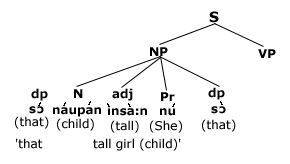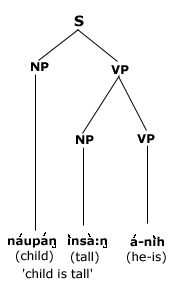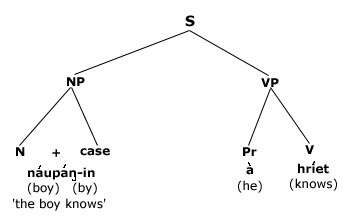| 4.1.1.3 |
If
gender reference of the head noun is required
to be made the NP gets further expanded by insertion
of the gender-marking post position just after
the adjective pushing thereby the repeated dp
a little away from the noun. Thus, the above phrase
would appear as under |
|
 |
If
definiteness is to be indicated, the marker gets affixed
directly to the head noun or to the pronoun, if there
is any. |
| 4.1.1.4 |
Thus
NP may consist of 5 constituents. Such an NP could
occur in the predicate slot as well. |
|
|
| 4.1.2.1 |
The
NP proper in Hmar shows a peculiar pattern. In
sentences where there is a 3p subject the VP always
carries an element of the subject pronoun with
it which is invariably prefixed. Thus, the smallest
VP in Hmar does not always consist of a verb alone;
there could be an element of subject pronoun of
3rd person too. In the following example the VP
/a-nìh/ consists of two
elements: /a/ means ‘he’ and /hìh/ means is’.
It is customary in Hmar to mention the relevant
pronoun for the subject along with the verb. In
sentences with 1st or 2nd person pronouns the
VP needs not necessarily to contain a personal
pronoun of appropriate person. The following example
could be seen. |
|
 |
4.1.2.2 |
The
VP can be expanded further by adding other constituent
auxiliaries for tense, aspect, mood etc. In a
sentence like |
|
 |
the
verb phrase /à-hríet/ obtains
an element of 3p pronoun /à/ and a verb /hríet/ meaning
‘knows’. It can be expanded further by adding the auxiliary
for the past tense as given below. |